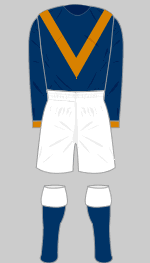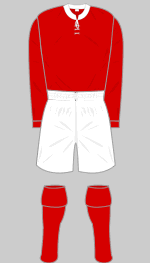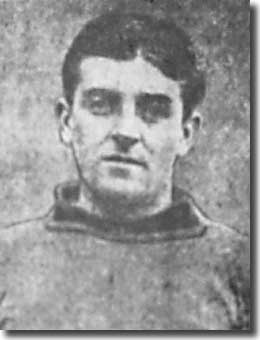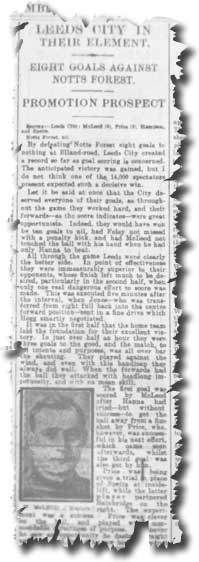 |
 |
 |
 |
 |
 |
 |
 |
 |
Second Division - Elland Road - 14,000
Scorers: McLeod 4, Price 2, Hampson, Speirs
Leeds City: Hogg; Copeland, Affleck; Law, Hampson, Foley; Bainbridge, Speirs, McLeod, Price, Sharpe
Nottingham Forest: Hanna; Dudley, Gibson; Armstrong, Mercer, Needham; Firth, Bell, Jones, Derrick, Banks
The signing of Jimmy Speirs in late 1912 from Bradford City brought
intelligence, direction and class to the City forward line, helping
centre-forward Billy McLeod to rediscover his most potent form.
He ended the 1912/13 season with 27 goals from 38 matches. In
the summer the attack was further enlivened by the arrival of
amateur winger and professional journalist Ivan Sharpe from Derby
County. It was a celebrated front five that included a Scottish international
(Speirs), the holder of an Olympic gold medal (Sharpe) and a player pushing
strongly for recognition by the selectors of the England team (McLeod).
There had also been some improvement in defence with the arrival of John
Hampson, signed by Chapman from his old club, Northampton Town. Interest in City's progress was such that season ticket sales for 1913/14
were close to £2,000. The optimism looked well founded as the Peacocks
prepared for their Elland Road clash on 29 November against lowly Nottingham
Forest. The East Midlanders were bottom of the table and would still be
there the following April. Going into the match, City had returned 16
points out of a possible 24 and were amongst the front runners for the
title. Speirs had seven goals, McLeod 6 and Arthur Price 4 as the Citizens
demonstrated deadly accuracy in front of goal. They were on a five game unbeaten run since a home defeat to
Hull City on 18 October. That had lifted them to fourth in the
Second Division table, three points behind leaders Notts County
but enjoying three games in hand on the table toppers. All the signs pointed towards an easy City win and that was exactly the
way it turned out, with the side achieving the All season, Speirs and Price had been operating at inside-left
and right respectively, but for this game Chapman switched their
positions. The only other change from the previous week's 2-2
draw at Blackpool saw young Simpson Bainbridge reinstated at outside-right
after missing three games through injury; Fred Croot made way
and Sharpe reverted to his favoured berth on the left wing. Forest sprang a surprise of their own. Right-back Harry Jones
was thrown in at the deep end in a switch to centre-forward with
Walter Dudley restored at full-back after six weeks' injury absence.
The gamble was a clear demonstration of Forest's weakness in front
of goal; their top scorer that season was winger Jack Derrick
who managed just eight. The Jones experiment was a failure; he
had a couple of decent moments and bothered City keeper Tony Hogg
with a fine drive in the second half, but never really looked
like he could make a fist of the opportunity. Price and Speirs, on the other hand, took to their new roles like ducks
to water. The Leeds Mercury was particularly taken with the former's
display, proclaiming, 'Price was clever on the ball, and played with considerable
directness of purpose. Whenever he saw an opportunity he dashed straight
away for goal, but if he saw his way barred to his objective, he passed
with promptness and decision. The play of the other forwards was characterised
by the same methods, but Price was the most conspicuous man in this respect.' City were in devastating form, quickly crushing any defiance that Forest
might have shown. The Mercury: 'It was in the first half that the
home team laid the foundations for their excellent victory. In just over
half an hour they were three goals to the good, and the match, to all
intents and purposes, was all over bar the shouting. They played against
the wind, and even with this handicap they always did well. When the forwards
had the ball they attacked with headlong impetuosity, and with no mean
skill.' In the opening exchanges Forest keeper Jack Hanna did well to
block a powerful drive from Price, but he could do nothing as
the alert McLeod pounced on the rebound to open the scoring. It
was no more than City deserved for some enterprising forward play. The early advantage was built on rapidly as Price converted his
promising play into goals. He struck twice to make City's lead
at the break emphatic. The home forwards were all over the Forest
rearguard, never allowing them a minute's peace as they harassed
mercilessly in an attempt to force errors out of their opponents.
Nottingham's cause was not helped by the loss of left winger Banks The 3-0 half-time advantage left Forest in a tenuous position and spirits
in their dressing room were low with manager Bob Masters unable to find
many words of encouragement. Their tormenters pressed on relentlessly
after the break and continued to pick holes in a helpless defence. Any
remote hopes of a comeback were almost immediately dispelled as Hampson
headed a fourth goal from a corner by Sharpe, before McLeod nabbed his
second to make it 5-0. Forest did what they could to rally; the Mercury noted that 'there
were times when they played with spirit, and occasionally their forwards
exhibited good work in midfield, but they lacked the necessary dash to
carry them successfully through the home defence'. There was a brief moment of relief for the visitors as Mick Foley
fluffed his lines when presented with the perfect opportunity
to open his account for the season. Forest conceded a penalty
and the Irishman was nominated to take it, but he could not convert
the opportunity. The City supporters groaned their dismay, but
their favourites were quickly back, pushing for more goals. Jimmy Speirs grabbed a sixth and the humiliation deepened as
McLeod really turned the screw, hitting two more goals to take
his tally to four in the match, and ten for the season. The final score was thus an emphatic 8-0, but it could have been
an even more resounding victory. Apart from the missed penalty,
McLeod ruined his chance of a fifth goal by handling the ball
when he had only goalkeeper Hanna to beat. The Mercury was gushing in its praise for the Peacocks. JRB wrote,
'Let it be said at once that the City deserved every one of their goals,
as throughout the game they worked hard and their forwards ... were great
opportunists. The reason why the Forest were so heavily beaten was because
they were up against a team whose men played clever football. The City
forwards - especially McLeod and Price - were a brilliant lot, who displayed
fire and resolution in all their attacks. They were supported by a trio
of halves who did their work excellently, while Copeland and Affleck were
a puissant pair of backs.' 'This score, which was a record for the City team, only marks the grand
advance in form which the team have shown this season ... the hopes of
their supporters will naturally dwell all the more lovingly on promotion
prospects,' wrote the Yorkshire Evening Post. 'Speirs changed places
with Price as the inside man to the wonderment yet ultimate gratification
of the club's numerous followers.' It wasn't quite a club record: in 1905, City had beaten junior side Morley
11-0 in an FA Cup preliminary round game with Fred
Hargraves grabbing four goals. David
Wilson also managed four in the 6-1 hammering of Clapton Orient in
March 1906. That had been the previous best in the League, equalled against
Stockport County in December of the same year. McLeod had been on the
score sheet that day, too, though his single goal contribution was eclipsed
by Jack Lavery's hat trick and two
from Bob Watson. The City centre-forward was truly a master marksman. His record in the
league with City now stood at 112 goals in 226 appearances, a country
mile more than anyone else had managed for the club on both accounts.
Such form took him close to international honours later in the campaign. McLeod enjoyed an impressive season and his goalscoring exploits caught
the attention of the England selectors. He was watched in the game against
Barnsley on 28 February, when he gave a decent display, opening the scoring
in a 3-0 win. He notched a hat trick against Wolves on Valentine's Day
and repeated the dose against Huddersfield on 14 March. Such form led to his selection as non-playing reserve for the Football
League XI against the Southern League on 9 February. He was accorded the
same honour when the League played their Scottish counterparts on 21 March
and was called up as reserve for the England team that played Wales on
16 March. Unfortunately, Harry Hampton of Aston Villa, Middlesbrough's
George Elliott and Notts County's Jack Peart were all rated more highly
at the time by the selectors and McLeod saw not a moment's playing action
from the three games. He would never come close to representative honours
again, but nevertheless, it was a great honour for both McLeod and Leeds. The crushing defeat of Forest was witnessed by a crowd of 14,000
excited spectators, with gate receipts amounting to £370. The
standing of the two clubs could not have been in greater contrast:
Forest's plight at the foot of the table was truly desperate,
with just 6 points taken from 15 games played; City had moved
up to a top three position and were the division's top scorers
with 33 goals from 13 matches. They were hotly fancied for the
promotion the club had been desperately pursuing since their formation
in 1904.
 The
arrival of Herbert Chapman as manager
of Leeds City in 1912 brought not only an
immediate return to the Football League by virtue of coming top of
the re-election poll, but also a distinct upturn in playing fortunes as
he led them to a sixth place finish
a year later. It was a renaissance that gave City's long suffering
followers genuine hopes that Chapman could also deliver the promotion
that they craved so passionately.
The
arrival of Herbert Chapman as manager
of Leeds City in 1912 brought not only an
immediate return to the Football League by virtue of coming top of
the re-election poll, but also a distinct upturn in playing fortunes as
he led them to a sixth place finish
a year later. It was a renaissance that gave City's long suffering
followers genuine hopes that Chapman could also deliver the promotion
that they craved so passionately. club's
best ever league victory.
club's
best ever league victory. through injury in that opening half.
through injury in that opening half.